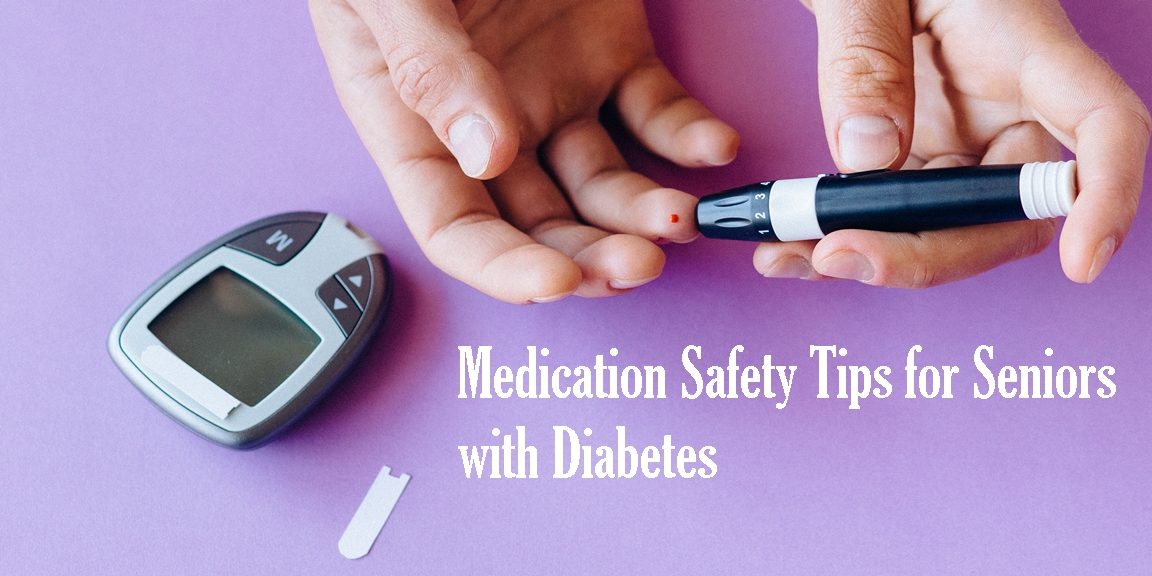Insulin and medications are important aspects of Diabetes management. However, older adults suffering from Diabetes, particularly if they have mental or physical limitations, managing medications can be challenging. In such situations, the role of caregivers becomes important. If you are working at a care home where you are responsible to take care of residents suffering from Diabetes, here are some medication safety tips that you will find helpful:
- Maintain a complete record of all the medications and supplements: As a caregiver, you have to maintain a list of all the active medications. This should include over-the-counter medications and herbal or nutritional supplements that the resident is taking. Seniors with diabetes often consult many health providers for different problems. A record of medication will help different doctors avoid potential interactions with prescription drugs or duplication of medications.
2. Know how drugs work and what are their potential side effects: You should develop a habit of explicitly asking residents how they feel after medication. This is particularly important when there is a change in the medication – whether it is a change in the dosage or medication time or any other change related to medicines. Being aware of potential side effects of medication can help you seek early medical intervention for the resident.
3. Keep monitoring blood sugar levels: Older adults with diabetes are often at a higher risk for hypoglycemia (low blood sugar) which can cause
- Fatigue
- Shakiness
- Anxiety
- Sweating
- Hunger
- Irritability
Seek the consulting GP to get advice on how frequently the glucose level should be checked as the frequency may vary from one person to another.
4. Give medications in the right dose and at the right time: For medications to be safe and effective, they must be taken in the correct dose, at a specific time and for a specific length of time. Some drugs have window-periods during which another dose should be given to ensure that medication works. The interval advised by the doctor should be maintained. Always check the concentration of the medication before administering it. Incorrect dosage due to error in calculation or confusion in conversion units can lead to side effects and in some cases, it can be life-threatening.
eMAR chart and care homes: How can the software help you manage medication for Diabetics?
Helping residents control their blood glucose levels requires round-the-clock commitment. By streamlining medication administration processes at care homes, eMAR reduces medication errors and helps the caregiving staff focus on other important factors such as planning Diabetes-friendly recipes and age-appropriate exercise plans for the residents. Many care homes in the UK are switching from MAR charts to electronic MAR. The eMAR charts will help you digitally maintain the records of the residents. Also, it sends reminders before each medication round, so that the resident gets the right medicine at the right time. With eMAR charts, making monthly, quarterly and annual reports are also easy. To know more benefits of implementing eMAR, book a demo today.








Great information! It’s also worth a conversation with the doctor to see if all of a senior’s medications are really necessary. Overmedication in older adults is a huge problem. This article explains more: https://www.responsive-homecare.com/is-someone-you-love-overmedicated/
Struggling with diabetes is a thing of the past with this amazing product. It provided me with actionable insights that significantly improved my health. click here to discover a better way to manage diabetes!
Dealing with diabetes, I was searching for a solution that was both effective and natural. One thing has been a lifesaver for me in blood sugar control. What got me hooked? The all-natural formula is a breath of fresh air. No synthetic stuff, just pure goodness of ingredients like Cinnamon, Juniper Berries and Biotin.
And the best part? It doesn’t just manage; it prevents insulin resistance, taking proactive steps for long-term health.
For anyone on a diabetes journey, it is a must-try. Plus, it comes with a 180-day money-back guarantee, making it a risk-free investment. Check it out here. Here’s to a healthier, worry-free future!